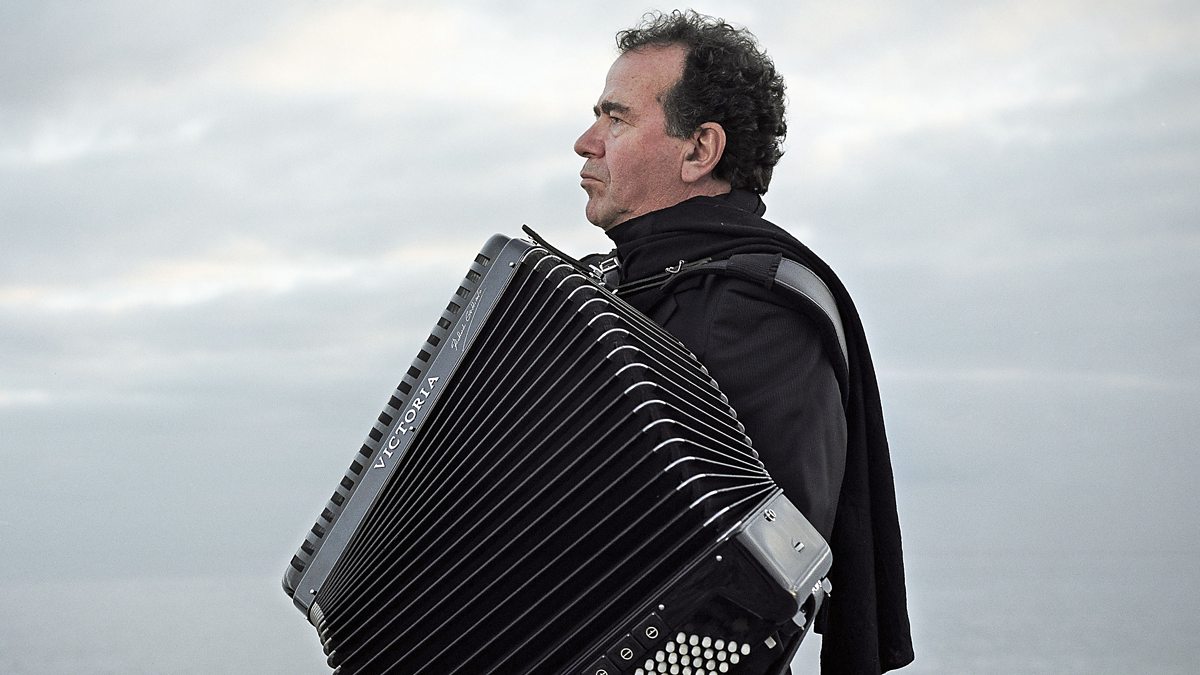Sat 6 April
4pm - Jazz Record Requests
Remember that requesting qualfies you to criticise this programme's offerings.
5pm - J to Z
Kevin Le Gendre introduces saxophonist Duncan Eagles, who performs music from Citizen, his debut release as a band leader. And British saxophone giant Steve Williamson shares his inspirations.
Anyone who managed to hear Duncan Eagles's set a few months ago will know for sure that the young man has truly landed, and become the fine and fiery player he promised when I first saw him getting really stuck in at a Streatham pub gig about 10 years ago organised by local pianist Andrea Vicari and her bassist and hubby Dorian Lockett. And we are truly blessed with this chance to hear Steve Williamson speaking of his interests and influences. Last week we heard one of his Jazz Warriors successors, Shabaka Hutchings, mentioning being influenced by "rap speak"; I think Steve was probably the pioneer in this particular area with remarkable recordings like "Waltz for Grace" he made in the late 1980s. I found a cassette of that going for a quid in the local market treasure trove a couple of years ago: it included two more tracks than on the vinyl!
12midnight - Geoffrey Smith's Jazz
Geoffrey Smith profiles Dallas-born reedsman and composer Jimmy Giuffre (1921-2008) - a fusion pioneer who crossed over from big band swing to country-folk to cool abstraction - and highlights Giuffre classics such as The Train and the River.
This is a repeat - and with the forthcoming demise of Geoffrey's much-valued programme one wonders if any new broadcasts are being lurked in the sealed bag. This was in my opinion one of the best, and well worth re-hearing, or catching if you missed out on it first time around.
(At school, we all used to wonder, how do you pronounce GIUFFRE???)
Mon 8 April
11pm - Jazz Now
Soweto Kinch presents Richard Galliano's New Jazz Musette. They play a dazzling fusion of jazz, French musette waltzes, tango and Brazilian music.
In the famous words of Queen Victoria, "We are not a musette".
Tues 9 April - BBC Radio 2
9pm - Jamie Cullum
Radio Academy-winning series, with singer Jamie Cullum showcasing his love of jazz, tonight featuring a live performance by Texas-raised jazz-R&B singer/songwriter Jazzmeia Horn.
Perhaps the Beeb should contemplate combining this programme with Jazz Now, using Jamie's establishment cred to rescue Soweto's considerably more substantial programme - with its eye intelligently directed to the young listenership the BBC is always on about needing to win over - from the wrecking ball. What does anybody think? Does anybody?
And not to be overlooked is the finale to Radio 4's excellent 3-parter - the last episode of which dealt from every vantage point with the impact of jazz on Europe and Britain during WWII:
9am - Black Music in Europe: A Hidden History
3/3 After 1945
Clarke Peters delves into the sounds of 1950s London, from Ambrose Campbell and his West African Rhythm Brothers and steel pan master Sterling Betancourt, to calypso star Lord Kitchener. He also uncovers the history of jazz in Paris after 1945, and tells how black American GIs found a new freedom in postwar Germany.
"Londonnne is the place for me; Londonnne, this loveleee citeeee".

I last saw Sterling Betancourt about ten years ago, playing in a restaurant in leafy East Dulwich - some of the best, most swinging unaccompanied bebop piano ever on offer, and a couple of calypso numbers on steel pans, Don't Stop the Carnival being one of them. There were only about four diners in the establishment at the time, although the gig had been advertised in the London What's On, as a freebie for which you didn't have to dine, and to be honest I was almost in tears to see this sweet guy pouring his and our heritage out as a mere accompaniment to the chink of cutlery, all that social and historical significance bundled away unrecognsed and almost unseen in the corner of the room, and didn't have the bottle to go up and speak to him. What would I have said? He was the pianist chosen by John Surman for the Side 1 of his debut eponymous album, recorded in 1968, and one subsequently learned that Surman and he had first met up at jam sessions held at the Coleherne pub in Earls Court, of all places, where musical encounters took place between some of the up-coming white British jazzers who'd been doing The Old Place and their black elders of Caribbean origin. It must have been amazing - swanky Kensington's equivalent to the Flamingo at the time.
4pm - Jazz Record Requests
Remember that requesting qualfies you to criticise this programme's offerings.
5pm - J to Z
Kevin Le Gendre introduces saxophonist Duncan Eagles, who performs music from Citizen, his debut release as a band leader. And British saxophone giant Steve Williamson shares his inspirations.
Anyone who managed to hear Duncan Eagles's set a few months ago will know for sure that the young man has truly landed, and become the fine and fiery player he promised when I first saw him getting really stuck in at a Streatham pub gig about 10 years ago organised by local pianist Andrea Vicari and her bassist and hubby Dorian Lockett. And we are truly blessed with this chance to hear Steve Williamson speaking of his interests and influences. Last week we heard one of his Jazz Warriors successors, Shabaka Hutchings, mentioning being influenced by "rap speak"; I think Steve was probably the pioneer in this particular area with remarkable recordings like "Waltz for Grace" he made in the late 1980s. I found a cassette of that going for a quid in the local market treasure trove a couple of years ago: it included two more tracks than on the vinyl!
12midnight - Geoffrey Smith's Jazz
Geoffrey Smith profiles Dallas-born reedsman and composer Jimmy Giuffre (1921-2008) - a fusion pioneer who crossed over from big band swing to country-folk to cool abstraction - and highlights Giuffre classics such as The Train and the River.
This is a repeat - and with the forthcoming demise of Geoffrey's much-valued programme one wonders if any new broadcasts are being lurked in the sealed bag. This was in my opinion one of the best, and well worth re-hearing, or catching if you missed out on it first time around.
(At school, we all used to wonder, how do you pronounce GIUFFRE???)
Mon 8 April
11pm - Jazz Now
Soweto Kinch presents Richard Galliano's New Jazz Musette. They play a dazzling fusion of jazz, French musette waltzes, tango and Brazilian music.
In the famous words of Queen Victoria, "We are not a musette".
Tues 9 April - BBC Radio 2
9pm - Jamie Cullum
Radio Academy-winning series, with singer Jamie Cullum showcasing his love of jazz, tonight featuring a live performance by Texas-raised jazz-R&B singer/songwriter Jazzmeia Horn.
Perhaps the Beeb should contemplate combining this programme with Jazz Now, using Jamie's establishment cred to rescue Soweto's considerably more substantial programme - with its eye intelligently directed to the young listenership the BBC is always on about needing to win over - from the wrecking ball. What does anybody think? Does anybody?
And not to be overlooked is the finale to Radio 4's excellent 3-parter - the last episode of which dealt from every vantage point with the impact of jazz on Europe and Britain during WWII:
9am - Black Music in Europe: A Hidden History
3/3 After 1945
Clarke Peters delves into the sounds of 1950s London, from Ambrose Campbell and his West African Rhythm Brothers and steel pan master Sterling Betancourt, to calypso star Lord Kitchener. He also uncovers the history of jazz in Paris after 1945, and tells how black American GIs found a new freedom in postwar Germany.
"Londonnne is the place for me; Londonnne, this loveleee citeeee".


I last saw Sterling Betancourt about ten years ago, playing in a restaurant in leafy East Dulwich - some of the best, most swinging unaccompanied bebop piano ever on offer, and a couple of calypso numbers on steel pans, Don't Stop the Carnival being one of them. There were only about four diners in the establishment at the time, although the gig had been advertised in the London What's On, as a freebie for which you didn't have to dine, and to be honest I was almost in tears to see this sweet guy pouring his and our heritage out as a mere accompaniment to the chink of cutlery, all that social and historical significance bundled away unrecognsed and almost unseen in the corner of the room, and didn't have the bottle to go up and speak to him. What would I have said? He was the pianist chosen by John Surman for the Side 1 of his debut eponymous album, recorded in 1968, and one subsequently learned that Surman and he had first met up at jam sessions held at the Coleherne pub in Earls Court, of all places, where musical encounters took place between some of the up-coming white British jazzers who'd been doing The Old Place and their black elders of Caribbean origin. It must have been amazing - swanky Kensington's equivalent to the Flamingo at the time.









Comment